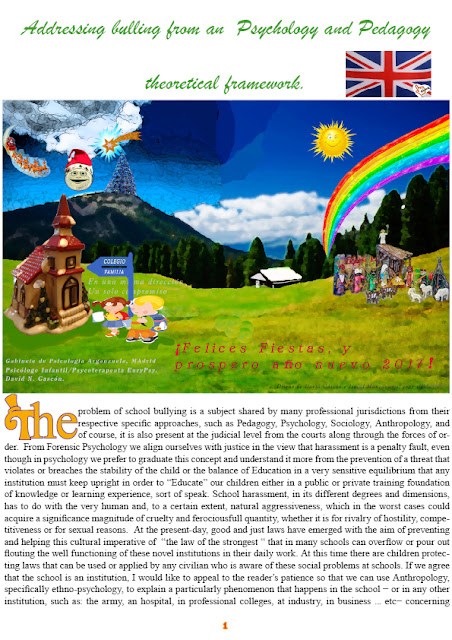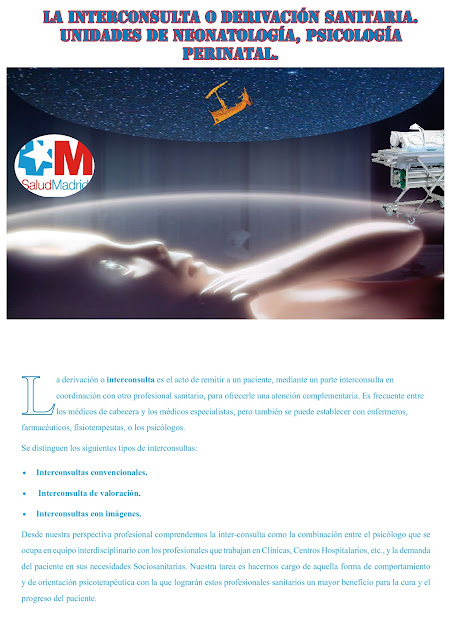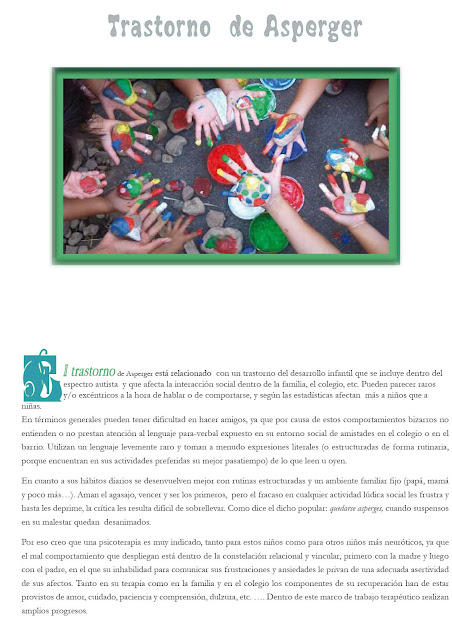Artículo de colaboración, en Inglés
The problem of
school bullying is a subject shared by many professional jurisdictions from
their respective specific approaches, such as Pedagogy, Psychology, Sociology,
Anthropology, and of course, it is also present at the judicial level from the
courts along through the forces of order.
From Forensic Psychology we align ourselves with justice in the view
that harassment is a penalty fault, even though in psychology we prefer to
graduate this concept and understand it more from the prevention of a threat
that violates or breaches the stability of the child or the balance of
Education in a very sensitive equilibrium that any institution must keep
upright in order to “Educate” our children either in a public or private
training foundation of knowledge or learning experience, sort of speak. School
harassment, in its different degrees and dimensions, has to do with the very
human and, to a certain extent, natural aggressiveness, which in the worst
cases could acquire a significance magnitude of cruelty and ferociousfull
quantity, whether it is for rivalry of hostility, competitiveness or for sexual
reasons. At the present-day, good and
just laws have emerged with the aim of preventing and helping this cultural
imperative of "the law of the
strongest " that in many schools can overflow or pour out flouting the
well functioning of these novel institutions in their daily work. At this time
there are children protecting laws that can be used or applied by any civilian
who is aware of these social problems at schools.
If we agree that the school
is an institution, I would like to appeal to the reader's patience so that we
can use Anthropology, specifically ethno-psychology, to explain a particularly
phenomenon that happens in the school or in any other institution, such as: the
army, an hospital, in professional colleges, at industry, in business ... etc−
concerning to normal and abnormal instinctive or mechanical behavior, that is
why we are thinking this topic!
Consequently,
certain healthy
adaptations may occur, whether they are external or internal type of adjustment
to any type of working social environment, and that is why children should
listen to their teachers, most of the time at certain point. On the contrary, other
"adaptations" or miss adaptation where the institution becomes bias
can develop a prejudice or an unfairness predisposition pathological school
environment (G. Devereux, Normal and abnormal, p. 27).
As the emotional
mellow in children is not fully formed, in the sense of acquiring the real, the
rational or the ability to sublimate their trends (what was in earlier times
called instinct), we must protect them ahead of those possible toxic emotions
that may troublesome children in their educational enlightening toward
adulthood. Helping children cope with emotions like envy, greed, resentment,
hatred, ill feeling, ill will, disagreement, defiance or any feeblemindedness
emotions that trouble development grow on kids.
Although what we
are saying is that the school, as an institution with rights and privileges,
has to educate the child preparing them for the experiences of become adult not
only intellectually, but emotionally, sensitively or psychologically allowing
them a minimum and sufficient organization in a controlled way those deviant tendencies
that could be sign up thought development grow .
Emotions in students that are
not always of loving and caring, compassionate or thoughtful, etc., so that
these emotions would not escort into a "war school". These kinds of
social ghosts (technically speaking: phantoms) may have a perverse, envious,
hostile or acerbic disposition creating a traumatic kick for students. If they
are already social stresses such us those harmful forces we have being talked
that hurt the student, “the trauma” are those harmful fallout that have already
impacted with creeping forces into the student psyche, and through there into
the mind and body connection. In this sense, it will be a school, or a
"non-school", that is unwell or ill the youngsters due to the fact that
these traumatic situations occur prematurely for them, because they haven’t
create the ease of use of satisfactory mental defenses, without any kind of
mental or social skills that harmonizes that shock in the psychosocial
encounter of the student with his collegial environment.
But there is a
change nowadays, in Europe at the same time in Spain, the school is now being
provided with appropriate cultural defenses, both psychological and material to
prevent nuisance in education. The first would be how to mature children in a
dialogue or an interlocution with one another, study and work as a team,
investigate in classrooms, collaboration groups, keep up with colleagues in
mutual understanding, and the second political implement are those means and
war- nings to denounce and settle on limits to harmful behavior by helping those
"Victims of Violence" who are in the spotlight of these harassment.
From these kinds of preventions to the premature trauma the children may be
exposed inside or outside school we may be engage in a drama of a very serious
problems that during adulthood can crystallize or organize not only in a
serious social negativism but also may well configured in a very important psychotic disorders, all
kind of them. Therefore, in school, education must be sought to be not only a
"consume subjects" or classes, but rather seeking a true
psycho-affective value for a human being.
It must enable the capacity for self-realization and sufficient self-esteem
to give access to maturity and to a true independence of inner personal
conflicts or grouping performance that could be sprouting at school. As we have said: the already cultural
reproduction of these phantoms (of competitiveness, rivalry, envy, greed ...) that
emerge from the subjective experience intra or intergroup, they do this in an
explosive mixture of inextricably ghosts
and myths mechanism, obsession acts behavior, ritual acts or idiosyncrasies
eccentricity that could “traumatized the environment” at school. All these
social anxiety that weights the environment has no escape in a normal and
adapted organization of people, on the contrary, deforming and distorting under
the “shelter” of the non-school establishment.
At this point, we would be at the gates of personality disorders (T.P)
by this causal way of school as a de-socializing institution.
But as we
understand that the work of our children's education is not only subordinated
to the domain of the School, we must help from home the educational philosophy
of the school we choose so it will be quite similar to that of the family´s
beliefs or creed. Therefore, prevention of violence such as bullying is also a
mission as of the family´s home, because it is also part of this equation to
solve in bullying deterrence.
Ana and I want
to put a significant accent in both the School and the Family, because those
are major concerns, along with their income into society in their conduit to
development, also there is a concurrence of interests, not usually raised in
primary education, but rather in secondary school.
From the most
positive and structured aspects of the family, there are messages and values
that are very important for the formation of our children. This is the case in
any family we call “normal”, so we have to check if the child will find these
values in the school he attends. For this reason, the education of the children
is mainly the responsibility of the parents, because it is the parents who
establish the principles, the values that we want to transmit to them
(religious, cultural, political, economic, artistic values). Parental functions that no one can take away
from us and no one can replace us, because it is the natural right of our
parents, a right also contemplated in our jurisprudence of the law of the
Patria Potestad (parental custody, legislation for parental rights). We cannot
just delegate it to school! We also take it into the account, in our Spain of
today, a pluralistic society in which different cultural, political or
religious options coexist.
That is
why, when we refer to "being attentive to teaching at school" we
include the skills of teachers. If the teacher transgresses his functions, does
not involve himself in the well-being of his students or does not adequately
perceive certain behaviors that occur in school life between peers, probably
will arise many complicated problems that we will have to solve in the long
run. Likewise, the teachers who are in charge of their students understand the
educational risk that corresponds to the parents, because they must be vigilant
before neglect, abandonment, indolence or inertia behaviors, so as to in the
most terrible situation: facing maltreatment!
And so, when the issues on this side of the problem, the family, could
have been evolving in a complicated way, we talk about basic conditions for the
prevention of violence in the family, that is: an affective relationship, warm
and without overprotection. What we are saying is that we should come across to
a careful awareness in the changing needs on child’s security and autonomy in
each of the stages of the children's lives, and look for a consistent
discipline without authoritarianism or negligence on our behalf.
From the
earliest stages, Emotional Education within the home is based on:
- The participation in the life of the children during all the stages of their development and the constancy in the affection according to their demands and/or necessities.
- Orientation and supervision at all times of their lives providing protection and support until autonomy.
- The development of appropriate behaviors by the example of the parent or parents, the family values instilled influence children from their early childhood.
- The rules negotiated and established as a whole, it is important that children have very clear expectations of their own behavior.
- Violent acts away from home. Parental control is necessary over the violence that appears in the mass media.
- Opposition to violence. Strong and calm words against the violent attitude and behavior in the family must win through.
The creation of
a communication and trust conduit with the children will alert us on symptoms
that could easy be disguise when there is a conflict related to the bullying in
the school. It is important that parents observe atypical behaviors such as
nervousness ("when they attributes to some novel event"), lack of
appetite ("when they say that he has eaten much in school"),
insomnia, poor performance at school ("when they comments that the
subjects are very difficult"), the phobia ("when they make up some
illness for not going to school") ...
How can parents
whose child may be abused be acting?
First, by
reacting calmly, placing himself in the son's place and trying to understand
his behavior. It is a priority to make
him see that he is not guilty of what is happening to him and that he has the
full support of the family. Next, it is very important to contact the
educational center to alert what is happening and offer cooperation in the face
of the resolution of the facts and, finally and if necessary, contemplate the
possibility of talking with professionals in the psychological field such us
the educational psychologist.
There can be no
educational process without peaceful coexistence in the classrooms and
educational communities serve up by schools. The actions taken in from the
Educational Center in School, or the Coexistence and Intervention Protocols are
underlying supportive. At the end of January 2016, the Ministry of Education
published a report on the Strategic Plan for School Coexistence that served as
a reference for students, families and teachers in tackling bullying in
schools.
Empathy as the
basis of justice, solidarity and Emotional Literacy as an ability to identify,
understand and express feelings in a healthy way should be pillars in the daily
coexistence within the schools. It is about “KNOWING HOW TO LIVE with others”.
Harassment from
the social perspective finds its roots in the domain-submission model so that
from the earliest school stages, it is very important that children learn to
live with the conflict and develop a thought with nuances. One of the most
demanded teaching functions nowadays is to look for the educational quality in
the heterogeneous contexts.
In Spain, each Autonomous Community
(federal sate?, province?) carries out its own protocols in case of bullying,
however, here you have a simple action plan that you can use and that can guide
you in case of need.
When we are in
doubt about a harassment attitudes, how to act in school?
1. Observe the
behaviors of the potential harasser in various situations within the school
context.
2. Contrast the
results of the observation by several members of the teaching team and look for
corresponded and matched comportment, elaborate a " STRATEGY " that
will consist of:
2.2. Obtaining
Information through the class-group: Sociogram, sociometric procedures,
specific tests, students’ opinion about violence (working the subject in the
classroom using group dynamics techniques) and dramatization of violence
through role-playing ...
2.3. Individual interviews with the
potential harasser.
3. Assessment of
the Educational Psychologist at his office.
4. Pass on the
results obtained by the Educational Psychologist´s assessment to the family.
Teasing and
fighting can be interpreted as "children's things" as long as
everyone involved manifests the same behavior and is not harmful to either,
both parties are equal and these attitudes are part of their growth and / or
development.
FREQUENTLY ASKED
QUESTIONS
Our STAR
question: How much does it cost to prevent bullying?
It depends on
how the call arrives, whether it comes from home, from school or from “third
parties”. A real anecdote that we can tell you was when a mother found out by
her little girl that her school friends called her "gafotas" (big
eyes ass hole). This little girl sad and angry told to her mother what had
happened from end to end the argument between peers that crack their
friendship. The mother asked, query, inquired... fortunately for her little
baby was the first time that had happened, then the mother was left thinking
... In a couple of hours she sat at the computer and wrote an email to the
tutor-counselor (the coach) of the girl at his school, explaining to him that a
group behavior of five little girl´s friends was bicker against his daughter.
In the evening she told her husband, at the next day he made a personal call to
the educational coach where she sent the email ... and that's it!
In less than 24
hours the school is put on alert, in less than a week the school starts the
prevention plan, which in this case only needed a chat with the whole class of
the girl and her friends.
It is done! It
has outlay love, concern, responsibility and overcoming parental and collegial
fears, and finally ... a nice talk with children!
Why is it so
difficult to raise the alarm?
Because it
engross an emotional phenomenon. Many times we cannot think because of fear or
trepidation, it is difficult for us to react, we have all kind of emotional
blurs arousing innermost. A large number of adults are introverted people
(albeit affable) and they possess a high degree of codes of behaviors such as
"caring for forms", excessive respect for “the manners” (I do not go
where they do not call me)... But there is also a cultural theme of this era of
the new technologies, what we call the emotional inertia of technological
development and the" market "of telecommunications (in a pejorative
sense). In the latter, they provide us with pleasures and satisfactions for all
taste and demands, most of which are loaded with excessive publicity with the
desire to sell, advertise, or marketing get-up-and-go... All these inventions
of our modern society are easily inflamed emotions without any creative effort
on setting work performance ongoing (in earlier times: reading, writing,
painting and/or drawing implied some effort on the part of the child in
learning and playing abilities). This consuming passivity, striving to learn
with the "least effort possible" brings harmful consequences to the
psyches of children. The child does not have "nothing to do", just
watch TV, connect to the internet, and play with the game console ... and, in
many cases within the virtual world violence is trivialized, like in war games.
Is School
Harassment limited to the victim and his harasser or can it be considered a
group and social phenomenon?
Bullying does
not understand social or sex distinctions, bullying makes its presence in
almost any context and it is a group and social meagerness phenomenon.
"There are no centers that are more conflicting than others but classrooms
more problematic than others" (Education Counselor Rafael van Grieken).
Therefore, to prevent intervention is necessary with the complete class-group
and the relationships and interactions that arise between all of them.
Can we apply
School Mediation in a Harassment case?
The School
Mediation is dedicated to the sensitization and information with the conflicts
(Essays, simulations, presentations ...). In order to select mediators,
criteria such as volunteerism, social attitudes and skills, attitudes of
solidarity and dialogue capacity, availability of time for formation, enjoying
social acceptance, good self-esteem, empathy or what we call active listening ...
In case of
school harassment it is not advisable to apply the mediation as such. We must
take into the account that the roles and status of those involved (victim and
harasser) are very polar. Mediation is a process of help in the situation of
psychological reciprocity that violence doesn´t have. The use of mediation in
the case of harassment could turn into a scenario in which the victim was
forced to use defense tools of which it doesn’t have and the aggressor would
increase its arrogance and its psychological dominion. The mediator would have
difficulties in controlling their own emotions and moral values since the
imbalance between both parties is very large. (La violencia escolar.
“Estrategias de prevención”, Rosario Ortega y Rosario Del Rey, Ed. Graó).
Can we talk
about harassment from Primary school?
We can talk
about conflicting behaviors that lead to harassment. The age where bullying
takes on in a great strength is likely to be from 12-13 years (with the advent
of adolescence). In the studies of José María Avilés (teacher and
psychologist), and those made by the Department of Preventive Psychology of the
UCM in collaboration with the Institute of Youth (INJUVE), shows that
harassment occurs daily and occurs mainly among students aged between 6 and 17
years. But the age of greatest risk in the onset of violence is between 11 and
15 years, because it is when more physically changes occur, or when they go
from school to institute for example.
We hope to have
helped readers with this explanation of a current and hot topic such as
bullying. Dr. Dan Olweus has been considered the pioneer in the study and
investigation of bullying and in the use of the word bullying, since he
implemented in the 70's in Sweden a study that would culminate with a complete
anti-bullying program for schools in Norway.
In Spain, following
the Cisneros VII Report, we can define the Harassment as "a continuous and
deliberate verbal and modal mistreatment that a child receives from another or
others, who behave cruelly with him in order to subjugate, frightening and
threatening the dignity of the child ", and mentioning the words of José
Antonio Luengo, former General Secretary of the Defense of the Child, says that
the problem is aggravated when children harassed, become bullies (in some
cases)," because
they realize, that they prefer a thousand
times the reproaches of parents and teachers for behaving badly with others,
than to be the target of the bully ".
Concluding: walking with the Family
and School in the same direction and with a single commitment.
Clinical Psychologist in Madrid
Tel: 636 55 45 62
Email: dnd.gascon@cop.es
Página Web: http://www.psicologaenmadridarganzuela.com
Email: dnd.gascon@cop.es
Página Web: http://www.psicologaenmadridarganzuela.com





Comentarios
Publicar un comentario